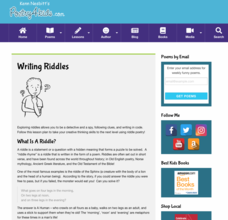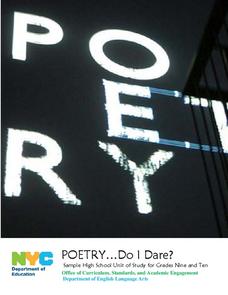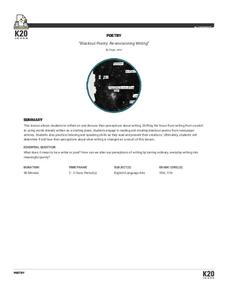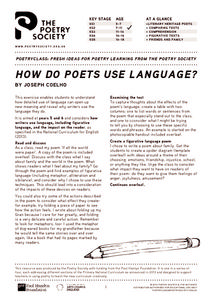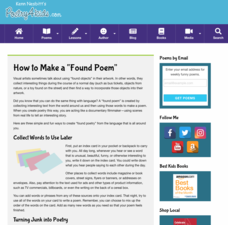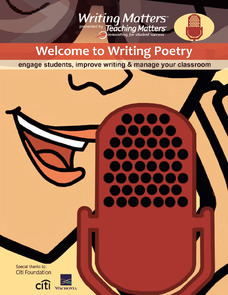Poetry4kids
How to Write a Limerick
Add a little fun and fancy to English language arts with an activity that challenges scholars to write a limerick. Authors follow five rules in order to compose an original poem that contains a specific rhyme scheme.
Poetry4kids
How to Write Funny Poetry — Chapter 1: Writing Poetry
Do you wish you could write poetry that makes people laugh? Now you can! Check out the first chapter in a poetry writing series that emphasizes the importance of connecting subject matter to a light, bouncy meter.
Curated OER
The Sound of…Poetry!
Scritch, scratch, scritch. It's the sound of pupils writing poetry! Focus on sensory language and onomatopoeia with a writing instructional activity. After listening to some sounds, learners examine a couple of poems that include sound...
Pearson
Practice Test - English Language Arts Reading Comprehension
An English Language Arts Reading Comprehension Practice Test for Grade 10 asks scholars to read a poem and answer two multiple-choice questions about the poem. They finish the task by responding to an open-response essay question.
Poetry4kids
Writing Riddles
What's got 60 eyes, 150 fingers, and an endless number of ideas? Your language arts class! Challenge young writers to come up with clever riddles with an online poetry lesson.
Curated OER
Writing a Memorable Poem
Nascent poets carefully examine a color photograph and then respond to a series of questions. Using these responses, they craft a poem prompted by the image. A link to powerful photos is included so the exercise can be repeated.
Curated OER
Modern and Classical Poetry
A fabulous presentation of poetry awaits your students. This rich, 14-slide PowerPoint presents many excellent ways for your pupils to compose poems. The presentation encourages them to play with words when composing poems, to analyze...
National Council of Teachers of English
Writing Poetry with Rebus and Rhyme
Young scholars write rhyming poems using rebus. With pictures instead of words, authors create original work about things they love.
Geography 360°
Poetry Writing
Put the tips and tricks in this guide into practice in order to encourage your pupils to blossom into poets. A wonderful reference material for teachers, this packet includes definitions of poetic terms and forms as well as step-by-step...
New York City Department of Education
Poetry…Do I Dare?
Whether you're considering a poetry unit or just want to incorporate more poetry in your curriculum, this unit plan is a must-have. Packed with poems, teaching points, powerful prompts, and poetry performance suggestions, the resource is...
Poetry4kids
How to Write an Exaggeration Poem
The best poetry writing lesson of all time is here for you! Learn all about the art of exaggeration with a lesson on exaggeration poems, which instructs students to use wild imagery to convey their message.
DLTK
Writing Limericks
Scholars are lucky to stretch their poetry writing muscles with a activity that challenges them to compose two limericks—one about a boy and the other about a dog.
Teacher's Corner
Shape Poetry
Calligrams, or shape poems, are the focus of ninth exercise in a ten-part poetry writing series.
Teacher's Corner
Acrostic
Do your students suffer from metrophobia? Assuage their fears by asking them to craft an acrostic, a form poem that begins with a single word. The first in a series of ten poetry writing exercises.
Curated OER
30 Writing Prompts for National Poetry Month
A collection of writing prompts are so fun, you'll want to finish them yourself! Learners practice narrative prose and poetry skills with prompts that twist traditional structure, provide wild vocabulary, and encourage pupils to...
Curated OER
Agriculture Awareness Through Poetry
Whether you are viewing a landscape painting of a farm, examining a still-life portrait of a bowl of fruit, or reading a descriptive poem about cultivating food, you can't deny that agriculture plays a major role in visual and language...
Hong Kong Special Administrative Region
Learning English through Poems and Songs
Exposing learners to the power of words in poetry is a stimulating way to learn languages. Songs, haikus, rhyming words, and narrative works are all employed in a resource for teaching English as a Second Language.
EngageNY
End of Unit Assessment: Writing Best First Draft of “Back Again” Poem
Team up! Scholars begin working with their research teams to review the components of an effective poem. They then move on to independent work by beginning the end-of-unit assessment. Writers complete the draft of their "Back Again"...
New York State Education Department
English Language Arts Examination: June 2016
The English Language Arts Examination handout contains a variety of multiple-choice questions to assess reading comprehension, in addition to a source-based argument essay and text-analysis response prompts.
K20 Learn
Blackout Poetry: Re-Envisioning Writing
New ReviewShed light on the beauty of language with a great poetry activity. After learning about Austin Kleon's blackout poetry model, pupils respond to some of his poetry and use it as a model to produce their own. Young writers also share their...
Poetry Society
How do Poets Use Language?
Why do writers choose the language they do? Here's a resource that has the poet himself answer that very question. Joseph Coelho explains why he chose the words and images he used in his poem, "If All the World Were Paper."
Poetry4kids
How to Create a “Found Poem”
Writers compose an original found poem by searching for words that inspire them. Words are taken from everyday conversation, books, cut from magazines, the mail, or an already written poem.
Teaching Matters
Welcome to Writing Poetry
Your pupils are poets, and now they'll be able to show it with the exercises in this packet. The lessons, designed for beginner, intermediate, and experienced poets, not only feature a variety of poetic forms, but take learners through...
EngageNY
Analyzing Poems from Inside Out and Back Again to Develop Criteria for an Effective Poem
Scholars analyze a model poem to help guide their poetry writing. They use Think-Pair-Share to discuss word choice and meaning in "Papaya Tree" and "Wet and Crying." To finish, they use their discussions to collect evidence on what makes...






